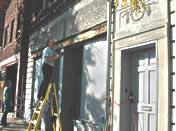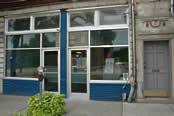New Substation To Decrease Crime, Restore the Neighborhood
By Kathy Garrison, Madisonville Weed and Seed Site Coordinator

In mid-August, the Madisonville Weed and Seed site in Cincinnati, OH, completed an urban renewal project in the heart of its business district that transformed two long-vacant storefronts into a new substation and a permanent Weed and Seed office. Renovating this property, which was donated by a local church, is part of the site's strategy of combining community policing with neighborhood restoration. By making its area safer and cleaner, the site also hopes this project will serve as a catalyst to revitalizing the whole community.
With the new substation, the police, both juvenile and adult probation officers, and the group Citizens On Patrol have a home base in the community. Likewise, the Weed and Seed initiative now has a permanent office where it can sustain the work that it has begun in collaboration with the U.S. Department of Justice and the city of Cincinnati.

Equally important, these facilities mark the beginning of the urban renewal of the central business district. Recent grants have helped the area to renovate its buildings' façades, but this has been the only overhaul of buildings in many years. It heralds the actual brick-and-mortar improvement in the physical structures that make up the community of Madisonville.
The Power of People
This new beginning started small. The Madisonville Weed and Seed Steering Committee developed a strong relationship with the New Life Temple, a local church. Last spring, the church donated two disused storefronts that it owned in the business district to the Weed and Seed efforts: one for the police substation and one for the Weed and Seed office. Both properties needed a tremendous amount of renovation, but members of the community saw this as a great opportunity to fulfill part of the Weed and Seed strategy and jump-start economic redevelopment in Madisonville. A church from one of the more affluent neighborhoods provided approximately $28,000 and many volunteers for the project. The outpouring of volunteers has been remarkable, with the community logging in well over 5,000 hours of volunteer help.
The project is an example of what a community can do with little to no funds but a lot of willing hearts. A grant from Cincinnati's Neighborhood Business District Improvement Project (NBDIP) provided half the funds. The NBDIP assists Cincinnati communities by providing funding for projects that stabilize, maintain, and improve the city's neighborhood business districts. Architects designed the offices pro bono and local merchants donated the building materials. Then, individuals throughout the community volunteered their time and skill-sets as engineers, construction company owners, bricklayers, drywall plasterers, electricians, plumbers, and carpenters. For instance, a local business learned about the renovation and agreed to provide additional electricians to install the service-entry wiring. Also, the project used individuals whom city officials had sentenced to community service, leading to an unexpected benefit: people who were previously on destructive paths in life gained invaluable relationships with staff members and volunteers at the Weed and Seed site.
To fulfill its increased law enforcement needs during the renovation, the Weed and Seed site acquired other grant monies so it could bring in the Hamilton County Sheriff's Department temporarily to inform the prostitutes and other criminals that the community would no longer tolerate their presence. Today, the prostitutes who lingered in that block are gone. The drug dealers and the users who shot up in the back of the buildings are gone too. The constant coming and going of workers along with the constant patrol of police have moved the criminal element from that block. The site's continued hope is that as it moves forward as a community, the crime will continue to decrease.
It's Just the Beginning
With the new substation, the community has made half of a city block cleaner and safer. The revitalization of the community is already evident. Two other storefronts on the block will be renovated to provide space for new businesses, and the old restaurant that was located next door is already starting to clean up its building. The synergy is catching. The area will be landscaped with flower pots and a patio garden in the back, and new lights will be installed.
Change will continue. The city is getting on board with the community with extensive code enforcements. The community is creating a "Quality of Life" group to help identify problems such as blighted homes and buildings, tall weeds, and abandoned cars—issues that the city has promised to resolve swiftly. And last but not least, the renovated properties give the police and community something to show off, something that spurs them to say to others, "Look what we can do if everyone works together."
For more information, please contact:
Kathy Garrison, Site Coordinator
513–460–5060
Also published by http://www.ncjrs.gov/ccdo/in-sites/community_1.html



